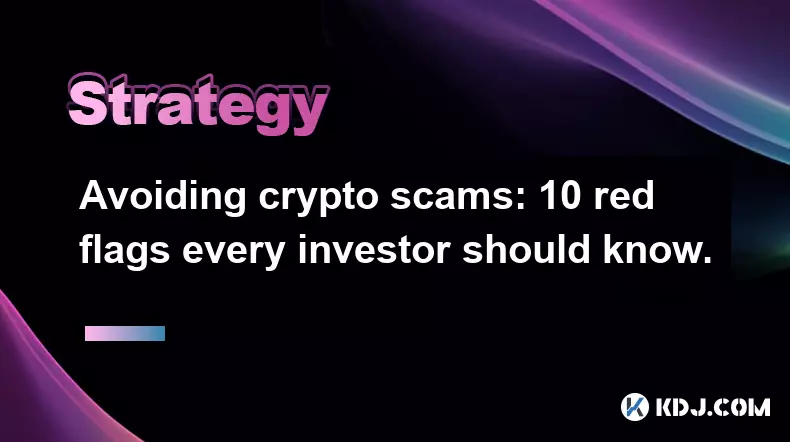-
 bitcoin
bitcoin $87959.907984 USD
1.34% -
 ethereum
ethereum $2920.497338 USD
3.04% -
 tether
tether $0.999775 USD
0.00% -
 xrp
xrp $2.237324 USD
8.12% -
 bnb
bnb $860.243768 USD
0.90% -
 solana
solana $138.089498 USD
5.43% -
 usd-coin
usd-coin $0.999807 USD
0.01% -
 tron
tron $0.272801 USD
-1.53% -
 dogecoin
dogecoin $0.150904 USD
2.96% -
 cardano
cardano $0.421635 USD
1.97% -
 hyperliquid
hyperliquid $32.152445 USD
2.23% -
 bitcoin-cash
bitcoin-cash $533.301069 USD
-1.94% -
 chainlink
chainlink $12.953417 USD
2.68% -
 unus-sed-leo
unus-sed-leo $9.535951 USD
0.73% -
 zcash
zcash $521.483386 USD
-2.87%
Avoiding crypto scams: 10 red flags every investor should know.
Promises of guaranteed high returns, anonymous teams, and fake urgency are major red flags in crypto—always verify audits, team credibility, and code transparency.
Nov 03, 2025 at 07:37 pm

Unrealistic Promises of High Returns
1. Projects that guarantee exponential returns in a short time frame often operate as Ponzi schemes. These platforms lure new investors with promises of doubling or tripling investments within days, relying on funds from later participants to pay earlier ones.
2. If a project claims you’ll earn 100% monthly returns with zero risk, it’s almost certainly fraudulent. Legitimate blockchain ventures focus on technology and long-term value, not guaranteed profits.
3. Scammers use polished marketing materials and celebrity endorsements to appear credible. However, real innovation doesn’t require fabricated testimonials or fake affiliations with well-known figures in the crypto space.
4. Some fraudulent tokens create artificial scarcity by locking liquidity for absurdly long periods while promoting urgency to buy now. This manipulation pressures users into quick decisions without proper due diligence.
5. Always verify whether the promised returns align with market trends and historical performance of similar assets. Extreme deviations should trigger immediate skepticism.
Lack of Transparency in Team and Code
1. A legitimate cryptocurrency project typically features a doxxed team with verifiable LinkedIn profiles, past experience in tech or finance, and active participation in developer communities.
2. Anonymous teams increase the risk of exit scams. If no one can be held accountable, there is little recourse if the developers disappear after raising capital.
3. Open-source code hosted on platforms like GitHub allows independent audits. Projects refusing to share their codebase or using obfuscated scripts are highly suspicious.
4. Check if smart contracts have been audited by reputable firms such as CertiK, Hacken, or ConsenSys Diligence. Unaudited contracts may contain backdoors or malicious functions enabling fund theft.
5. A red flag appears when whitepapers are copied from other projects or filled with technical jargon without clear utility. Genuine whitepapers explain tokenomics, use cases, and development roadmaps in detail.
Pressure Tactics and Fake Urgency
1. Scammers frequently use countdown timers, limited slots, or exclusive access offers to rush investors into depositing funds before thinking critically.
2. Social media channels and Telegram groups are flooded with bots posing as happy investors sharing fake profit screenshots. These orchestrated campaigns simulate popularity and trust.
3. Phishing websites mimic legitimate exchanges or wallets, urging users to connect their MetaMask or input private keys. Once entered, attackers drain accounts instantly.
4. No genuine project will demand immediate action under threat of missing out forever. Take time to research, consult community forums, and cross-check domain authenticity.
5. Be cautious of unsolicited DMs offering free tokens or investment advice. These are common tactics used to gain access to your wallet or personal information.
Fake Listings and Impersonation
1. Fraudulent tokens sometimes appear on unofficial exchange listings, claiming partnerships with major platforms like Binance or Coinbase without authorization.
2. Impersonators create fake social media accounts mimicking real executives or influencers, posting links to scam presales or giveaway programs requiring upfront payments.
3. Domains resembling official sites differ by one letter or use alternate top-level domains (.net instead of .com). Always double-check URLs before interacting.
4. Verify official links through trusted sources such as the project’s verified Twitter bio or community announcements. Never rely solely on search engine results, which can be manipulated via SEO poisoning.
5. Watch for sudden spikes in mentions across Reddit, Discord, or X (formerly Twitter) tied to unknown tokens. Coordinated hype often precedes pump-and-dump schemes.
Frequently Asked Questions
How can I check if a crypto project has been audited?Look for audit reports published on the project’s official website or linked from their GitHub repository. Reputable auditing firms provide public verification. You can also search the auditor’s site directly using the project name or contract address.
What should I do if I sent funds to a scam contract?Immediately stop any further transactions. While blockchain transactions are irreversible, reporting the address to platforms like Chainalysis or Etherscan’s scam reporting system may help warn others. Contact your wallet provider if phishing was involved.
Are all anonymous crypto teams scams?Not all, but anonymity increases risk significantly. Some privacy-focused projects maintain pseudonymous teams, yet still publish detailed technical documentation and engage transparently with the community. Evaluate based on overall credibility, not just identity disclosure.
Can fake exchanges steal my login credentials?Yes. Cloned versions of popular exchanges replicate login pages to harvest usernames, passwords, and 2FA codes. Always ensure the URL is correct and avoid clicking links from emails or messages. Enable hardware-based two-factor authentication whenever possible.
Disclaimer:info@kdj.com
The information provided is not trading advice. kdj.com does not assume any responsibility for any investments made based on the information provided in this article. Cryptocurrencies are highly volatile and it is highly recommended that you invest with caution after thorough research!
If you believe that the content used on this website infringes your copyright, please contact us immediately (info@kdj.com) and we will delete it promptly.
- Shiba Inu Developer Defends Leadership Amidst Price Criticism, Eyes Future Developments
- 2026-02-01 03:50:02
- Dogecoin's Volatile Dance: Navigating Hidden Opportunities Amidst Nuclear Risk
- 2026-02-01 04:25:01
- MEXC's Gold Launchpad Ignites Zero-Fee Investments in Tokenized Gold Amidst Gold's Record Rally
- 2026-02-01 04:40:02
- DOGEBALL Unleashes L2 Gaming Revolution with Explosive Crypto Presale
- 2026-02-01 04:35:01
- GPT-5's Foresight, Solana's Frontier, and Ethereum's Enduring Gauntlet: Navigating the New Crypto Epoch
- 2026-02-01 04:35:01
- Crypto Coaster: Bitcoin Navigates Intense Liquidation Hunt as Markets Reel
- 2026-02-01 00:40:02
Related knowledge

How to Develop a Crypto Exit Strategy to Secure Your Profits?
Jan 22,2026 at 10:19am
Understanding Market Cycles and Timing1. Cryptocurrency markets operate in distinct phases: accumulation, markup, distribution, and markdown. Recogniz...

How to Find and Invest in Promising DePIN Crypto Projects?
Jan 19,2026 at 06:19pm
Understanding DePIN Fundamentals1. DePIN stands for Decentralized Physical Infrastructure Networks, combining real-world hardware deployment with bloc...

How to Find Liquidity Pools with the Lowest Impermanent Loss Risk?
Jan 25,2026 at 05:59pm
Fundamental Characteristics of Low-Risk Liquidity Pools1. Stablecoin pairs dominate the lowest impermanent loss environments due to minimal price dive...

How to Analyze Market Sentiment Using the Crypto Fear & Greed Index?
Jan 24,2026 at 09:39am
Understanding the Crypto Fear & Greed Index1. The Crypto Fear & Greed Index is a composite metric that aggregates data from multiple sources including...

How to Hedge Your Crypto Portfolio Against a Market Crash?
Jan 19,2026 at 03:40pm
Risk Assessment and Portfolio Allocation1. Determine the total exposure to high-volatility assets such as memecoins or newly launched tokens without a...

How to Use Technical Analysis for Short-Term Bitcoin Trades?
Jan 25,2026 at 01:00pm
Understanding Candlestick Patterns1. Bullish engulfing formations often appear after a sustained downtrend and signal potential reversal points where ...

How to Develop a Crypto Exit Strategy to Secure Your Profits?
Jan 22,2026 at 10:19am
Understanding Market Cycles and Timing1. Cryptocurrency markets operate in distinct phases: accumulation, markup, distribution, and markdown. Recogniz...

How to Find and Invest in Promising DePIN Crypto Projects?
Jan 19,2026 at 06:19pm
Understanding DePIN Fundamentals1. DePIN stands for Decentralized Physical Infrastructure Networks, combining real-world hardware deployment with bloc...

How to Find Liquidity Pools with the Lowest Impermanent Loss Risk?
Jan 25,2026 at 05:59pm
Fundamental Characteristics of Low-Risk Liquidity Pools1. Stablecoin pairs dominate the lowest impermanent loss environments due to minimal price dive...

How to Analyze Market Sentiment Using the Crypto Fear & Greed Index?
Jan 24,2026 at 09:39am
Understanding the Crypto Fear & Greed Index1. The Crypto Fear & Greed Index is a composite metric that aggregates data from multiple sources including...

How to Hedge Your Crypto Portfolio Against a Market Crash?
Jan 19,2026 at 03:40pm
Risk Assessment and Portfolio Allocation1. Determine the total exposure to high-volatility assets such as memecoins or newly launched tokens without a...

How to Use Technical Analysis for Short-Term Bitcoin Trades?
Jan 25,2026 at 01:00pm
Understanding Candlestick Patterns1. Bullish engulfing formations often appear after a sustained downtrend and signal potential reversal points where ...
See all articles





















![THIS IS THE HARDEST COIN TO GET [POLY DASH] THIS IS THE HARDEST COIN TO GET [POLY DASH]](/uploads/2026/01/31/cryptocurrencies-news/videos/origin_697e0319ee56d_image_500_375.webp)




















































